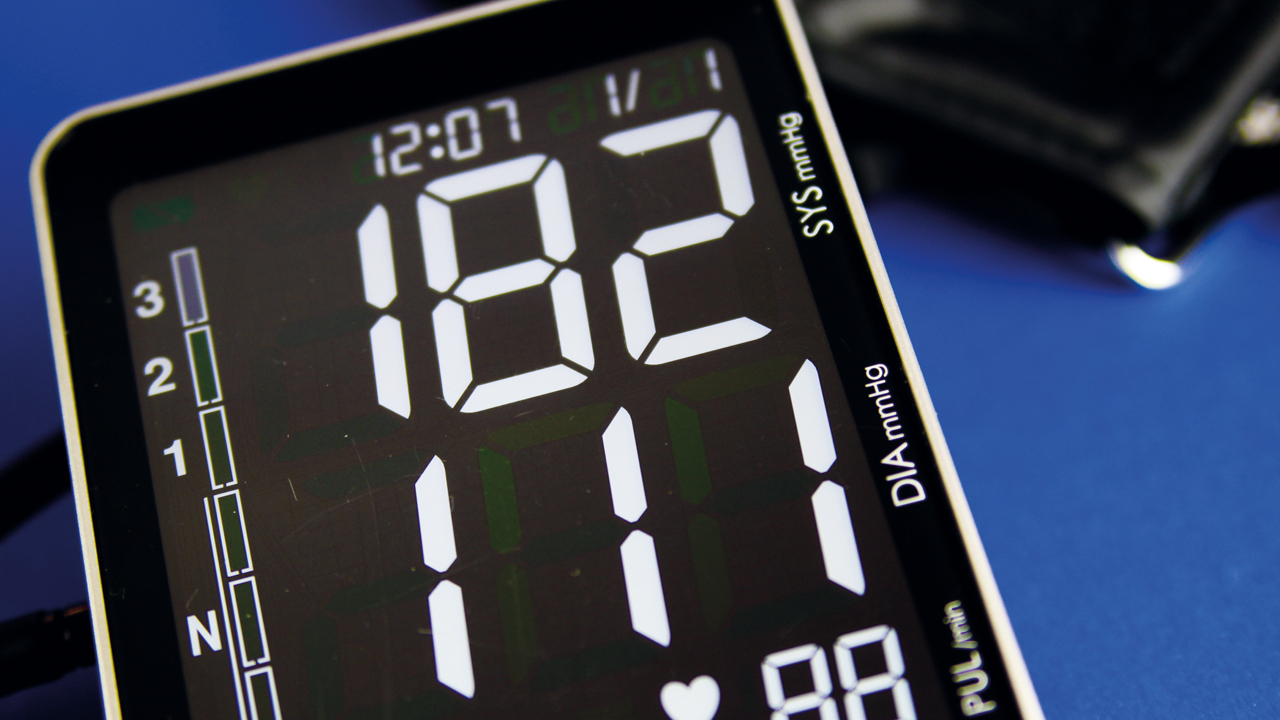In Clinical
Follow this topic
Bookmark
Record learning outcomes
Key facts
- Hypertension underlies more than a fifth of cardiovascular disease (CVD) cases as well as a third of all strokes
- 30 per cent of men and 25 per cent of women in England had hypertension during 2019
- Antihypertensives are effective but BP control and adherence is often poor.
Antihypertensives are highly effective: good BP control cuts the incidence of stroke by 35-40 per cent, myocardial infarction by 20-25 per cent and heart failure by 50 per cent. Yet even if a person has diagnosed hypertension, there is no guarantee that their BP will be well controlled.
The UK study1 included 99,468 people, with a median age of 62.3 years. Nearly half (46.9 per cent) of those with hypertension were unaware that they had raised BP but a quarter (26.9 per cent) of those who were aware they had hypertension remained untreated.
Only two in five (38.1 per cent) of those treated for hypertension showed good BP control, defined as systolic BP (SBP) less than 140mmHg and diastolic BP (DBP) less than 90mmHg – but good BP control depends on where you draw the line. Using a threshold of less than 160/100mmHg, 20.7 per cent were still sub-optimally treated.1
The study confirmed that numerous factors increase the likelihood of poor BP control. Hypertension, for example, becomes more common with age, rising from 7 per cent of those aged 25-34 years in England to 54 and 66 per cent of those aged 65-74 years and 75 years and older respectively.2 Increased vascular stiffness, a reluctance to intensify medications and issues around polypharmacy may, at least in part, underlie poor BP control among older adults.1
The study also confirmed that black people are more likely to have resistant hypertension than white people.1 Genetic differences may contribute. African Caribbean communities also tend to be in more socio-economically deprived areas.3
Socio-economic deprivation may undermine hypertension control through poor access to care, difficulties following healthy lifestyle advice, treatment differences, poorer quality services, lower health literacy and more chronic stress.1,3
Adults in the most deprived parts of the UK are also almost twice as likely to be obese as those in the least deprived areas (36 and 20 per cent respectively).4 Hypertension in obese people may arise from, for instance, over-activity of the sympathetic nervous system, activation of the renin-angiotensin-aldosterone system, fat compressing the kidneys (which increases renal pressure) and inflammation.5
The study also found that certain comorbidities increase the likelihood of good BP control including CVD, smoking, migraines, atrial fibrillation or flutter, diabetes and depression.
Better BP control probably reflects the greater number of interactions with healthcare professionals. This results in earlier detection, more aggressive treatment, and better health promotion and counselling about adherence in people with comorbidities, all of which may improve BP control.1
People in the UK study self-reported comorbidities and treatment, and the analysis did not include certain other factors associated with BP control, such as healthcare use and adherence, which is often poor.1,6
A US study of 1,544 people taking antihypertensives found that 24.1 per cent adhered poorly based on pharmacy refills (proportion of days covered less than 80 per cent). Based on self-reports, 38.9 per cent adhered poorly with antihypertensives.6
Combination treatment
Antihypertensives reduce BP in different ways, making combination treatment logical. Indeed, 13.9 per cent of people in the UK with high blood pressure received at least three antihypertensives.1
Despite the expanding antihypertensive armamentarium, medicines are not enough. Blood pressure represents the constantly shifting interaction between environment, behaviour and biology. By combining their expertise in pharmacology, medication management and lifestyle counselling, community pharmacists can help alleviate the pressure of hypertension.
References
- Open Heart 2021;8: DOI:10.1136/openhrt-2020-00146
- Available here
- Available here
- Available here
- Cell and Tissue Research 2021; 385:393-404
- American Journal of Hypertension 2021; 34:895-909
- Journal of the American College of Cardiology 2020; 75:632-647
- European Heart Journal 2022; DOI:10.1093/eurheartj/ehac208.

